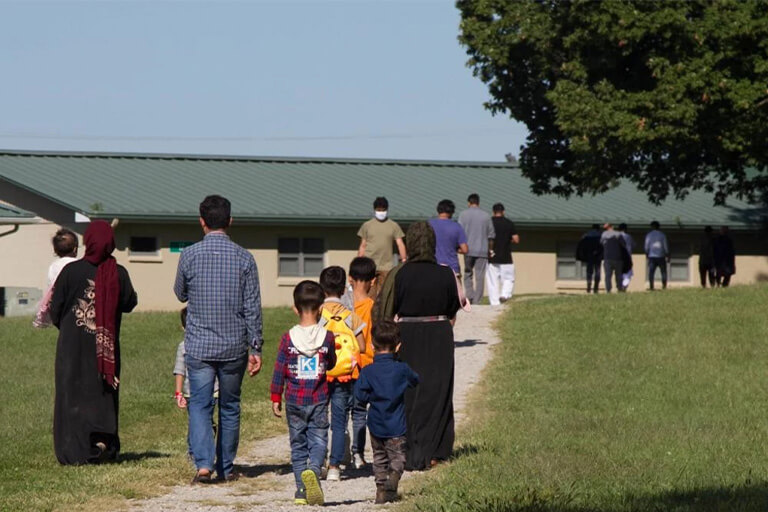https://news.iu.edu/live/news/27732-iu-mobilizes-in-support-of-afghan-evacuees
By Lana Spendl
Whether they have relevant language or military experience or just feel called to help, people and groups at Indiana University have mobilized to support the 6,600 Afghan refugees at military and civilian post Camp Atterbury, near Edinburgh, Indiana. With the Department of State's recent approval of Bloomington as Exodus Refugee's second federally authorized resettlement site, opportunities will open for students to continue the kind of work being done at Atterbury now.
"Part of IU's mission is to deploy the resources and expertise of our faculty, students and staff to advance human welfare locally and globally," said Hannah Buxbaum, IU vice president for international affairs. "We stand in solidarity with all affected by this crisis and strive to support the Afghan refugees here in Indiana to the fullest extent."
Efforts have spanned campuses and areas.
IU Bloomington
After the first group of evacuees arrived in Indiana on Sept. 2, Elliott Nowacky was contacted by senior U.S. Army leadership at Atterbury who were seeking people with knowledge of the region or of the Dari and Pashto languages. Nowacky, who is the student services and military relations coordinator for the Hamilton Lugar School of Global and International Studies, established communications lines with Atterbury and asked for assistance from Dave Baer, assistant director of the Center for Languages of the Central Asian Region, and Joey Bradshaw, project manager in the Language Workshop.
Baer took the lead in coordinating faculty, staff, students and friends of IU to act as interpreters. Twenty-six potential interpreters were identified, half of whom were women and could work with women and children, and Nowacky sent their names to Atterbury. Some began working on a volunteer basis, some as temporary hires.
Bradshaw leveraged the Language Training Center grant and expertise from the Center for Languages of the Central Asian Region to create a Dari phrasebook for soldiers at Atterbury. The flipbook was based on a Slovak flipbook that the Language Training Center had previously published.
Professor of geography Elizabeth Cullen Dunn, who serves on the Exodus Refugee Board of Directors, helped write the resettlement application to the Department of State. With the College of Arts and Sciences and the Office of the Vice Provost for Research, Dunn is also discussing a possible Center for the Study of Forced Migration.
In early September, Dunn helped welcome arrivals to Atterbury.
"I've just never seen people so tired and shocked. I saw them filing through family by family -- I handed them bags with towels and shampoos and razors -- and their immediate thoughts, after resting, went to their families who were still in Afghanistan," Dunn said. "Part of what we can do at IU is reach out to people and be guides within this culture. What they will need is friendship."
Todd Burkhardt, director of campus partnerships for the Center for Rural Engagement, became a member of Team Rubicon after hearing that Atterbury was part of the resettlement project. Team Rubicon leverages the skills of veterans and first responders to provide relief to those affected by disasters and humanitarian crises. Burkhardt, who has served in Afghanistan, posted calls for supplies and cash donations for goods on social media and swiftly found himself the point of contact for the Bloomington campus and community. Local schools and churches coordinated efforts to drop off supplies, and Burkhardt and his wife, Missy Burkhardt, drove them up to Team Rubicon at Atterbury in several trips.
"The swift and robust efforts of our faculty, staff and students have been truly remarkable," said John Applegate, IU Bloomington interim provost and executive vice president. "IU Bloomington's intensive work in culture, language and migration studies leaves us particularly well poised to do everything we can to offer support, solidarity and friendship to all those affected by this terrible crisis, and our community is committed to finding every way -- big and small -- to do so."


